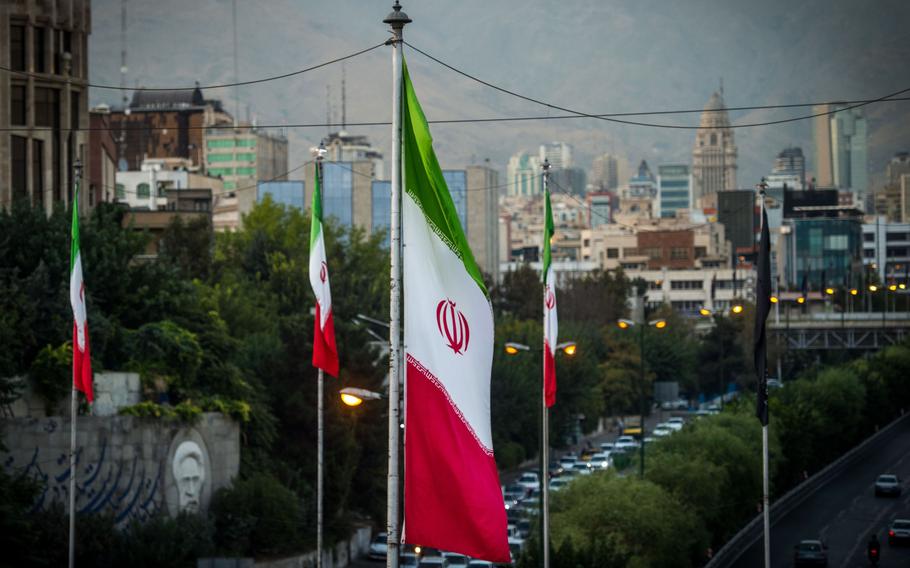
Iranian national flags fly near a major highway through Tehran, Iran, on Tuesday, Sept. 17. 2019. (Ali Mohammadi/Bloomberg)
A few weeks ago marked the 37th anniversary of one of the darkest chapters in modern Iranian history: the 1988 prison massacre. Acting on a fatwa issued by Ayatollah Ruhollah Khomeini, the regime executed more than 30,000 political prisoners — most of them affiliated with the People’s Mojahedin Organization of Iran (PMOI/MEK). These executions were carried out in secret, without trial, and with the explicit goal of eliminating political dissent.
For decades, the world remained largely silent. Only recently has the United Nations begun to acknowledge the massacre for what it was: a crime against humanity, and, in the words of former U.N. Special Rapporteur on Iran, amounted to genocide.
But the crime did not end in 1988. The Iranian regime continues to deny justice to the victims, persecute their families, and glorify the massacre as a “historic success.” Under international law, this makes the massacre an ongoing crime.
Today, the Islamic Republic appears poised to repeat its past atrocities. In recent weeks, Iranian courts have sentenced three political prisoners — Farshad Etemadi-Far, Masoud Jamei and Alireza Mardasi — to double death sentences and additional prison terms, following years of torture and solitary confinement. Their only alleged offense: association with the MEK. Two others, Saman and Davood Hormat-Nejad, received long prison sentences for similar charges. Dozens of political prisoners are currently on death row, with seven of their sentences already upheld by the regime’s Supreme Court.
This is not a random surge in repression — it is a calculated campaign of fear and retribution. Regime officials and state-run media have openly praised the 1988 massacre as a “successful precedent” and have called for its repetition. The regime is emboldened not only by the absence of internal resistance but by the continued silence of the international community.
Inside Iran’s prisons, the threat is immediate and growing. Saeed Masouri, one of the country’s longest-serving political prisoners, now in his 25th year of incarceration, in a message smuggled from prison, warned that the recent death sentences were part of a broader plan to eliminate political prisoners, echoing the tactics used in 1988. Fellow inmates have raised similar alarms, citing arbitrary arrests, fabricated charges, and systematic torture.
The responsibility to act lies squarely with the international community — especially democratic nations like the United States, Canada, and members of the European Union. Canada, as the official penholder of the upcoming U.N. General Assembly resolution on Iran, must ensure that the resolution to be voted on in November includes a clear and unequivocal reference to the 1988 massacre and demands accountability. This is not only a matter of historical justice — it is a test of the international community’s resolve to prevent another mass atrocity. To remain silent now would be to repeat the mistakes of the past. Tehran will interpret silence as a green light for mass executions; hesitation will be seen as complicity.
The U.N.’s fact-finding mission on Iran must respond urgently to this escalating crisis. It should launch an immediate investigation into the treatment of political prisoners, demand unrestricted access to detention facilities, and hold Iranian authorities publicly accountable for any further executions or abuses. The international community must support this mission with every available diplomatic, political and legal tool.
At the same time, democratic governments must issue strong public condemnations of the new death sentences and the broader assault on political dissent. Iranian diplomats should be summoned to receive formal protests. Targeted sanctions must be imposed on all officials — judicial, prison and security — implicated in torture, extrajudicial killings and unlawful detentions.
This is a defining moment for global leadership. The world must make clear that it will not tolerate another chapter of state-sanctioned murder in Iran. To do anything less would be a betrayal of our deepest principles — and an abdication of our shared responsibility to prevent another crime against humanity.
Let us not wait for another generation to look back in shame at what we failed to do. The time to act is now.
J. Kenneth Blackwell is a former U.S. ambassador to the U.N. Human Rights Commission in Geneva.